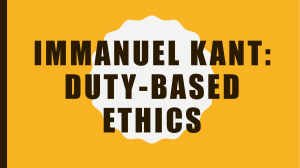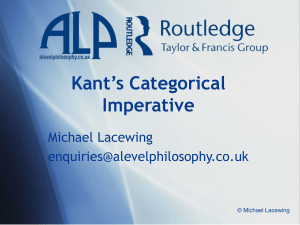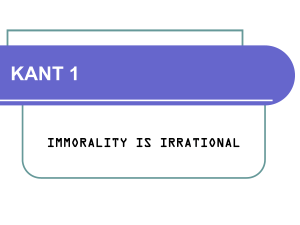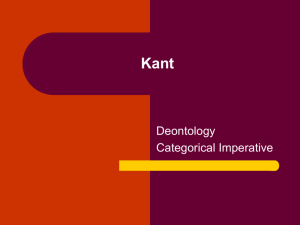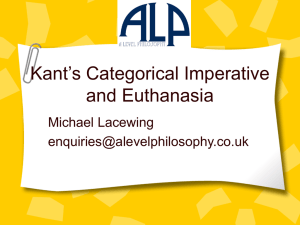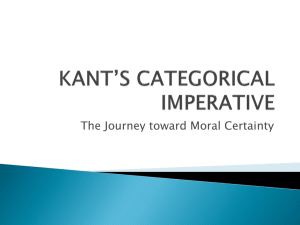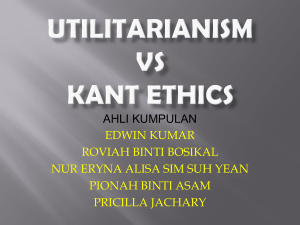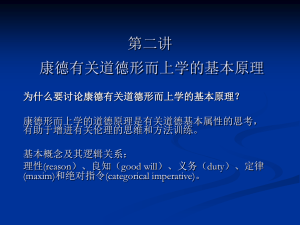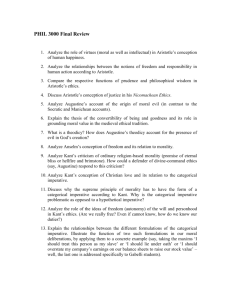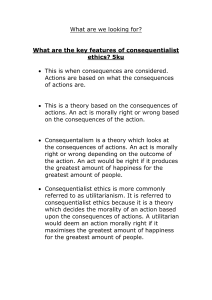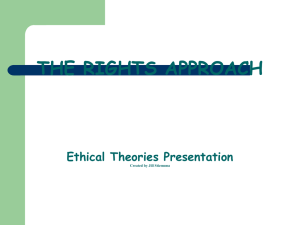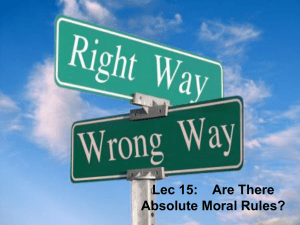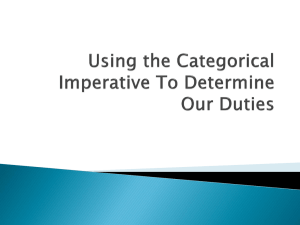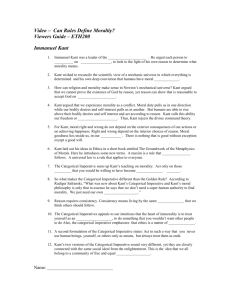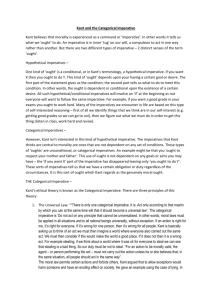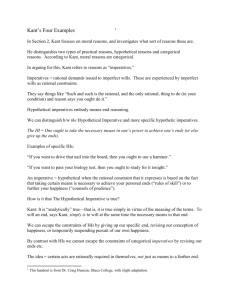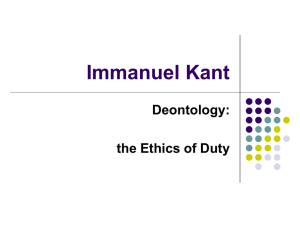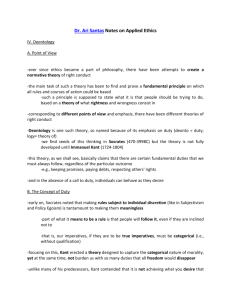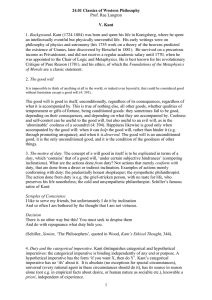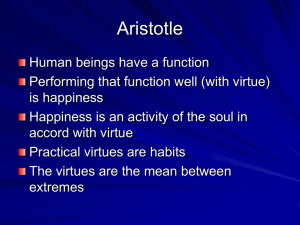Kant`s Theory of Right
advertisement
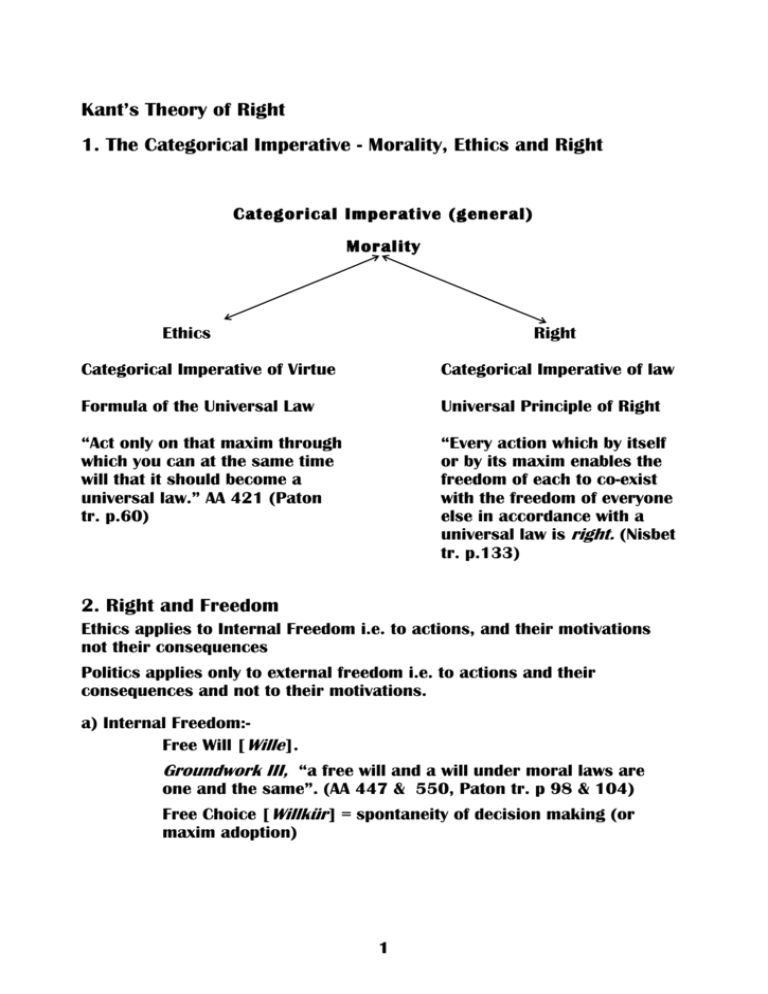
Kant’s Theory of Right 1. The Categorical Imperative - Morality, Ethics and Right Categorical Imperative (general) Morality Ethics Right Categorical Imperative of Virtue Categorical Imperative of law Formula of the Universal Law Universal Principle of Right “Act only on that maxim through which you can at the same time will that it should become a universal law.” AA 421 (Paton tr. p.60) “Every action which by itself or by its maxim enables the freedom of each to co-exist with the freedom of everyone else in accordance with a universal law is right. (Nisbet tr. p.133) 2. Right and Freedom Ethics applies to Internal Freedom i.e. to actions, and their motivations not their consequences Politics applies only to external freedom i.e. to actions and their consequences and not to their motivations. a) Internal Freedom:Free Will [Wille]. Groundwork III, “a free will and a will under moral laws are one and the same”. (AA 447 & 550, Paton tr. p 98 & 104) Free Choice [Willkür] = spontaneity of decision making (or maxim adoption) 1 b) External Freedom:“Right is applied to external freedom alone i.e. to actions which can directly or indirectly influence the actions of other free beings, hence right concerns “external and practical” relationships between free subjects (MM Intro §B Nisbet, tr. p.133). So, by restricting right to external freedom Kant makes it clear that that Politics and the State have nothing to say regarding the goals or ends pursued by the members of the state - including the goals of happiness. (See 5 below and Theory and Practice II, p. 74-5.) N.B. Don’t confuse external and internal freedom with freedom from and freedom to. External freedom is negative i) involves the absence of obstacles to my freedom of action ii) belongs to individuals and iii) implies no claims about what it is good for me to do. Internal Freedom is positive i) concerns the question of autarchy “who governs my actions” ii) implies some claims about what it is good for me to do, though iii) unusually for positive freedom applies to individuals not groups. 3. The Concept of Right Right [Recht] = both law [Gesetz] & justice [Gerechtigkeit] Right implies i) systematicity and ii) lawlikeness i.e. universality and necessity. 4. Right and Coercion The legitimacy of coercion follows a priori from the principle of Right. Appendix to “On Perpetual Peace” Kant claims that; “As hard as it may sound, the problem of setting up a state can be solved even by a nation of devils (so long as they possess understanding.)” So a successful political state does not require a moral community; it requires only that citizens can calculate their own self-interest. 2 5. The Right and the Good Right, the system of state laws, does not advance or promote any substantial goals. It is not based on and does not aim at the happiness of the citizen body. “No generally valid principle of legislation can be based on happiness” (TP Nisbet p.80) In the state of right, “each remains free to seek happiness in whatever way he thinks best, so long as he does not violate the lawful freedom and rights of his fellow subjects at large.” (ibid.) 6. The Social Contract idea of an original social contract= not an historical fact, but only a thought experiment, serving as a criterion of legitimacy or a “test of the rightfulness of every public law” (TP 79) “For if the law is such that a whole people could not possible agree to it...it is unjust; but if it is at least possible that a people could agree to it, it is our duty to consider it as just...” Agreement compossibility of the actions of a community of externally free agents, each of whom wills only those restrictions to his freedom which are compatible with the freedom of everyone else. Hence an “Enlightened Despot” such as Frederick II, can make just laws. Not true that a democratic process of legislation, can come up with laws which are valid according to the principle of Right. Kant says that the sovereign stands under an obligation to “to make the mode of government conform to the original idea, and thus to alter the mode of government by a gradual and continuous process ...until it accords in its effects with the only rightful constitution, that of a pure republic.” However, it is not clear what sort of an obligation this is. It is not a political obligation, for then the citizens would have the right to a republican constitution, and they would then be able to use force to attain this end. But Kant, notoriously denies any right to rebellion or to sedition (Political Writings 144-5) even where the head of state fails his obligation to make just laws. 3

